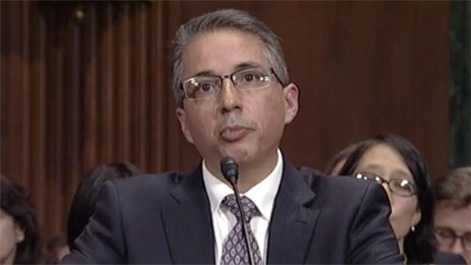|
|
|
|
|
|
 |
|
|
Fernando
Rodriguez
Jr.
speaks
before
the
Senate
Judiciary
Committee
in
November
2017.
From
Senate
Judiciary
Committee/File |
| |
Federal
Judge
blocks
Trump-Era
migrant
deportations,
citing
legal
overreach
Tanya
Sommerfield
-
Immigration/Law
Tell Us
USA News
Network
BROWNSVILLE,
TX - A
federal
judge in
Texas
has
ruled
that
former
President
Trump
exceeded
his
authority
by
invoking
the
Alien
Enemies
Act to
deport
Venezuelan
migrants
without
due
process.
U.S.
District
Judge
Fernando
Rodriguez
Jr.
found
that the
administration’s
claim of
an
“invasion”
lacked
evidence
and
violated
existing
immigration
laws,
specifically
the
Immigration
and
Nationality
Act,
which
outlines
proper
deportation
procedures,
including
hearings.
His
ruling
permanently
blocks
such
removals
in South
Texas
and
delivers
a
significant
legal
setback
to the
administration’s
immigration
enforcement
strategy.
Rodriguez’s
ruling
emphasizes
that a
president
cannot
unilaterally
declare
an
invasion
to
justify
emergency
powers,
particularly
in
peacetime.
Immigration
lawyers
and
advocates
praised
the
decision,
arguing
that the
Alien
Enemies
Act—an
18th-century
wartime
statute—was
never
intended
for
broad
use
against
migrants
in
modern
immigration
policy.
The
American
Civil
Liberties
Union
and
other
legal
groups
say the
ruling
sets an
important
precedent,
curbing
executive
authority
over
immigration
enforcement
and
reinforcing
due
process
rights.
This
case is
part of
a
broader
legal
battle
over
immigration
policies.
Courts
in New
York,
Pennsylvania,
and
Colorado
have
issued
temporary
restraining
orders
against
similar
deportations
under
the act,
signaling
wider
judicial
opposition.
Rodriguez’s
ruling,
however,
is the
first to
permanently
block
such
deportations,
potentially
influencing
future
immigration
enforcement
efforts
and
shaping
legal
interpretations
of
executive
power in
immigration
matters.
With
increasing
scrutiny
from
federal
courts,
the
ruling
raises
questions
about
how
future
administrations
will
handle
migration
and
deportation,
particularly
regarding
emergency
powers
and due
process
protections.
|
|
|
|
|
|
|
|
|